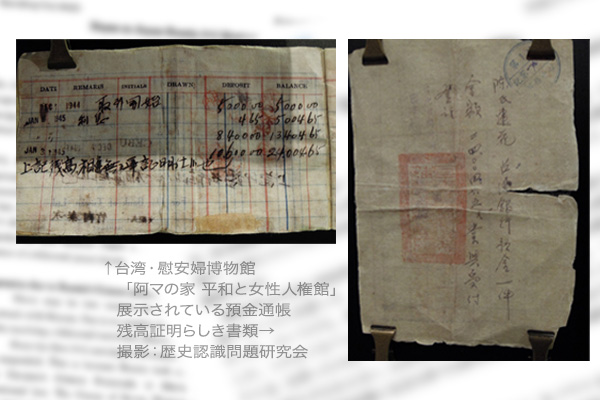In late March, I called at a private museum on Taiwanese comfort women during my visit to Taipei for an on-the-spot survey of historical awareness in Taiwan. Surprisingly, a bank book of a former comfort woman was found among exhibits there. A deposit balance as of January 1945 was given as 24,004.65 yen. While the museum’s English explanation described comfort women as “sex slaves,” her bank book specifying the massive deposit balance clearly shows that the woman was not a slave forced to work without pay.
A bank book found at a Taiwanese museum
I conducted the survey under the auspices of the Historical Awareness Research Committee I chair. I founded the committee jointly with Shiro Takahashi, a director of the Japan Institute for National Fundamentals, Yoichi Shimada, a member of the JINF Planning Committee, and others in 2016. JINF President Yoshiko Sakurai serves as adviser to the research committee.
The museum I visited is Ama Museum – a Museum of Peace and Women’s Human Rights, opened in December 2016 by the Taipei Women’s Rescue Foundation, a nongovernment organization for women’s human rights. Ama means grandmother. An unveiling ceremony of the museum’s nameboard in March 2016 was attended by then Taiwanese President Ma Yingjeou.
The bank book shows that the former comfort woman’s account was opened on December 7, 1944, when 5,000 yen was deposited in the account. On January X (too blurred to read), 1945, 8,400 yen as well as 4.65 yen in interest were deposited. The last record on the bank book shows that 10,600 yen was deposited to boost the balance to 24,004.65 yen on January 31, 1945. Just below the deposit balance is a note certifying the balance as authentic.
An apparent balance certificate exhibited next to the bank book is titled “Bank of Taiwan deposit for Chenshih Lienhua,” indicating that the bank book was issued by the Bank of Taiwan. The record of deposits in the account indicates that remittance from a battle zone had arrived at the bank. The owner of the bank book should have been able to withdraw the deposit. Why she did not do so is unknown.
Unsettled personal claims
The 1965 Treaty on Basic Relations between Japan and the Republic of Korea and the relevant claims agreement have settled South Korean citizens’ individual claims including those for deposits and savings. However, Taiwanese citizen’s individual claims have not been settled. When signing a peace treaty with Japan, the Republic of China government in Taiwan waived claims for wartime damages. Although Japan proposed negotiations to settle Taiwanese citizens’ claims, the Nationalist Party, or Kuomintang, that formed the authoritarian government had no idea of protecting Taiwanese citizens and refused to accept the Japanese offer. As a result, Taiwanese citizens’ claims for wartime damages have been left unsettled. The owner of the bank book might have held the book expecting that she would receive compensation from Japan someday.
It has already been known that former South Korean comfort woman Moon Ok Ju deposited 26,145 yen when she was working at a comfort station in Burma. She filed a lawsuit against the Japanese government seeking to withdraw massive military savings she made at the comfort station. Although she had lost her bank book, the deposit amount was identified in records for the postal savings system that took over the military savings system. Moon testified that a house sold for 1,000 yen in her hometown of Daegu and that she remitted 5,000 yen to her parents.
South Korean government of President Park Chung Hee used the settlement money from Japan to pay personal compensation to bank book holders at the exchange rate of 1 yen to 30 won. Later, President Roh Moo Hyun’s government paid compensation to deposit and savings holders at a revised exchange rate of 1 yen to 2,000 won. South Korea has thus made a difference from Taiwan.
Tsutomu Nishioka is a senior fellow and a Planning Committee member at the Japan Institute for National Fundamentals and visiting professor at Reitaku University. He covers South and North Koreas.


